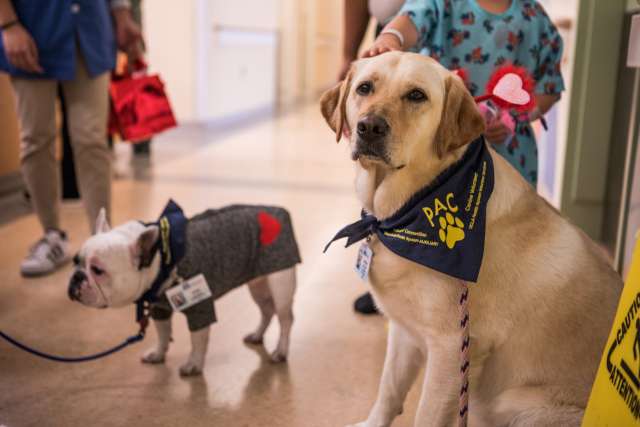Dear Doctors: My brother was just diagnosed with PTSD. I would like to know more about that. A guy in his veterans’ support group who got a therapy dog says it's helping him feel better. I'm interested in any research about therapy dogs and PTSD. Are they a good idea?
Dear Reader: For those who may not be familiar, PTSD is short for post-traumatic stress disorder. It's a collection of symptoms that can occur after someone experiences a dangerous, shocking or frightening event. It may be a traumatic one-time incident, such as a violent crime, an accident or an assault, or it may be a prolonged series of events, as would occur in a war zone or when living in a persistently stressful or harmful environment.
The symptoms of PTSD, as well as their intensity and duration, vary from person to person. And because they typically begin to emerge several months -- and sometimes longer -- after the initial event, the condition can go undiagnosed. Symptoms include unwelcome and unmanageable memories, poor sleep or insomnia, nightmares, an amplified startle response, low mood, irritability, depression, poor concentration and self-destructive or risky behaviors. People with PTSD often feel isolated from those around them, which can lead them to withdraw from social interaction. They may also begin to avoid the places and activities that can trigger their symptoms.
Even mild PTSD can lead to a diminished quality of life. In more acute cases, it interferes with the person's ability to fully participate in daily activities. Treatment often includes the group therapy that your brother is engaged in. Several forms of cognitive and behavioral therapy, exposure therapy, one-on-one talk and psychotherapy and medication are also used.
When it comes to whether therapy dogs can lessen the severity of the symptoms of PTSD, the research is somewhat limited. However, the studies that do exist, along with a wealth of anecdotal evidence, suggest that they can, indeed, be beneficial. This includes easing the person's sense of isolation, providing a sense of security and helping them to be more connected, not only to the animal, but also to the people around them. The work of caring for a dog, including feeding, walking and grooming, is also seen as therapeutic.
Each person's specific situation influences the type of dog that would be most beneficial. This includes how the dog would fit into and affect their living situation. For some, a companion animal, which is basically a well-trained pet, is adequate. It is recommended these have a calm and stable temperament, with an easygoing personality. The next step up is a therapy dog. It has the same characteristics as a companion animal, but also has undergone a screening or vetting process.
For some people, a service dog is the best match. This is a dog trained to recognize the needs of its handler and perform specific tasks to address those needs. In PTSD, this can take the form of specific interactions to manage anxiety, fear or panic.
If your brother is interested in a therapy dog, his mental health care provider can help him explore the options available.
(Send your questions to [email protected], or write: Ask the Doctors, c/o UCLA Health Sciences Media Relations, 10960 Wilshire Blvd., Suite 1955, Los Angeles, CA, 90024. Owing to the volume of mail, personal replies cannot be provided.)





